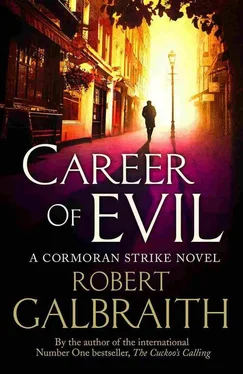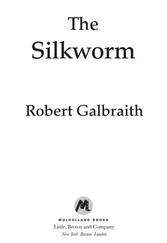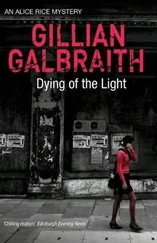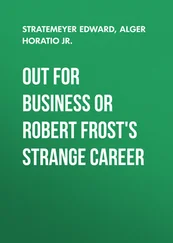Three years later, Strike had arrived in Cyprus to investigate an alleged rape. On entering the interrogation room he came face to face for the second time with Donald Laing, who was now carrying a little more weight and sporting a few new tattoos, his face heavily freckled from the Cyprus sun and creases etched around the deep-set eyes.
Unsurprisingly, Laing’s lawyer objected to the investigation being undertaken by a man whom his client had once bitten, so Strike swapped cases with a colleague who was in Cyprus investigating a drugs ring. When he met this colleague for a drink a week later Strike found, to his surprise, that he was inclined to believe Laing’s story, which was that he and the alleged victim, a local waitress, had had clumsy, drunken, consensual sex which she now regretted because her boyfriend had heard rumors that she had left her place of work with Laing. There were no witnesses to the alleged attack, which the waitress claimed had taken place at knifepoint.
“Real party girl,” was his fellow SIB man’s assessment of the alleged victim.
Strike was in no position to contradict him, but he had not forgotten that Laing had once managed to gain the sympathy of a senior officer after a display of violence and insubordination witnessed by hundreds. When Strike asked for details of Laing’s story and demeanor, his colleague had described a sharp, likable man with a wry sense of humor.
“Discipline could be better,” the investigator admitted, having reviewed Laing’s file, “but I don’t see him as a rapist. Married to a girl from home; she’s out here with him.”
Strike returned to his drug case in the sweltering sun. A couple of weeks later, by now sporting the full beard that grew conveniently fast when he wished to look “less army,” as the military phrase had it, he was to be found lying on the floorboards of a smoke-filled loft, listening to an odd story. Given Strike’s unkempt appearance, his Jesus sandals, baggy shorts and the sundry bracelets tied around his thick wrist, the stoned young Cypriot dealer beside him was perhaps justified in not suspecting that he was talking to a British military policeman. As they lounged side by side with spliffs in their hands, his companion confided the names of several soldiers dealing on the island, and not merely in cannabis. The youth’s accent was thick and Strike was so busy memorizing approximations of the real names, or indeed pseudonyms, that the new name of “Dunnullung” did not immediately suggest anyone he knew. Only when his companion began to tell him how “Dunnullung” tied up and tortured his wife did Strike connect Dunnullung with Laing. “Crazy man,” said the ox-eyed boy in a detached voice. “Because she try and leave.” Upon careful, casual questioning, the Cypriot confided that he had had the story from Laing himself. It seemed to have been told partly to amuse, partly to warn the young man with whom he was dealing.
The Seaforth Estate had been baking in the midday sun when Strike visited it the following day. The houses here were the oldest of the island’s military accommodation, white-painted and a little shabby. He had chosen to visit while Laing, who had successfully eluded his charge of rape, was busy at work. When he rang the doorbell, he heard only a baby’s distant cries.
“We think she’s agoraphobic,” confided a gossipy female neighbor who had rushed outside to share her views. “There’s something a bit off there. She’s really shy.”
“What about her husband?” asked Strike.
“Donnie? Oh, he’s the life and soul, Donnie,” said the neighbor brightly. “You should hear him imitating Corporal Oakley! Oh, it’s spot on. So funny.”
There were rules, many of them, about entering another soldier’s house without his express permission. Strike pounded on the door, but there was no answer. He could still hear the baby crying. He moved around to the rear of the house. The curtains were all closed. He knocked on the back door. Nothing.
His only justification, if he had to defend his actions, would be the sound of that baby crying. It might not be considered sufficient reason for forcing entry without a warrant. Strike mistrusted anyone who was overreliant on instinct or intuition, but he was convinced that there was something wrong. He possessed a finely honed sense for the strange and the wicked. He had seen things all through his childhood that other people preferred to imagine happened only in films.
The door buckled and gave the second time he shouldered it. The kitchen smelled bad. Nobody had emptied the bin for days. He moved into the house.
“Mrs. Laing?”
Nobody answered. The baby’s feeble cries were coming from the upper floor. He climbed the stairs, calling out as he went.
The door to the main bedroom stood open. The room was in semidarkness. It smelled horrible.
“Mrs. Laing?”
She was naked, tied by one wrist to the headboard, partially covered by a heavily bloodstained sheet. The baby lay beside her on the mattress, wearing only a nappy. Strike could see that it looked shrunken, unhealthy.
As he bounded across the room to free her, his other hand already scrambling for the mobile to call an ambulance, she spoke in a cracked voice:
“No... go away... get out...”
Strike had rarely seen terror like it. In his inhumanity, her husband had come to seem almost supernatural. Even as Strike worked to release her wrist, which was bloody and swollen, she begged him to leave her there. Laing had told her that he would kill her if the baby was not happier when he returned. She did not seem able to conceive of a future where Laing was not omnipotent.
Donald Laing had been sentenced to sixteen years’ imprisonment for what he had done to his wife, and Strike’s evidence had put him away. To the last, Laing had denied everything, saying that his wife had tied herself up, that she liked it, that she was kinky that way, that she had neglected the baby, that she had tried to frame him, that it was all a put-up job.
The memories were as filthy as any he had. Strange to relive them while the Mini moved past sweeping slopes of green, sparkling in the strengthening sun. This scenery was of a kind that was not familiar to Strike. The sweeping masses of granite, these rolling hills, had an alien grandeur in their bareness, in their calm spaciousness. He had spent much of his childhood perched on the coast, with the taste of salt in the air: this was a place of woodland and river, mysterious and secretive in a different way from St. Mawes, the little town with its long smuggling history, where colorful houses tumbled down to the beach.
As he passed a spectacular viaduct to his right, he thought about psychopaths, and how they were to be found everywhere, not only in run-down tenements and slums and squats, but even here, in this place of serene beauty. The likes of Laing resembled rats: you knew they were there, but you never gave them much thought until you came face to face with one.
A pair of miniature stone castles stood sentinel on either side of the road. As Strike drove into Donald Laing’s hometown, the sun broke through, dazzlingly bright.
So grab your rose and ringside seat,
We’re back home at Conry’s bar.
Blue Öyster Cult, “Before the Kiss”
Behind the glass door of a shop on the high street hung a tea towel. It was decorated with black line drawings of local landmarks, but what attracted Strike’s attention were a number of stylized yellow roses exactly like the tattoo he remembered on Donald Laing’s powerful forearm. He paused to read the verse in the middle:
It’s oor ain toon
It’s the best toon
That ever there be:
Here’s tae Melrose,
Gem o’ Scotland,
The toon o’ the free.
Читать дальше











